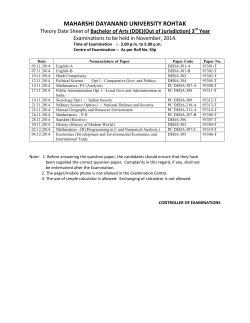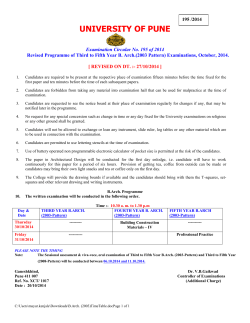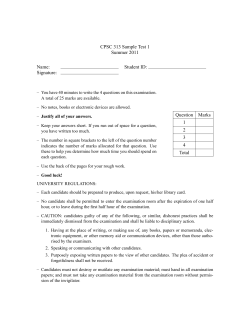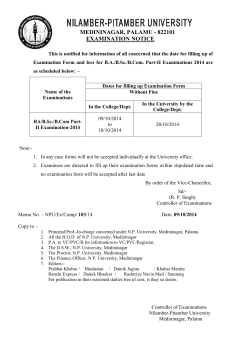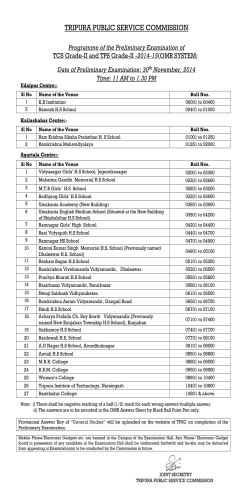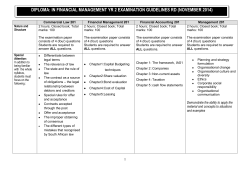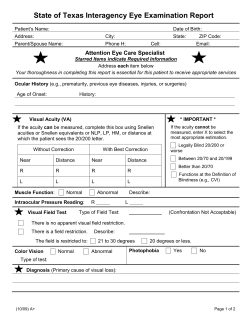
NZREX Clinical Handbook for Candidates Telephone 0800 286 801, ,
NZREX Clinical Handbook for Candidates Medical Council of New Zealand Level 6 80 The Terrace Wellington, 6011 New Zealand Telephone 0800 286 801, www.mcnz.org.nz, [email protected] Protecting the public, promoting good medical practice Te tiaki i te iwi whānui me te whakatairanga pai i te mahi e pā ana ki te taha rongoā DM665322 2 Contents Introduction 3 English language requirements 3 Medical knowledge 4 Location and timing of NZREX Clinical 5 Format and content of NZREX Clinical 5 Instructions to candidates 10 Communication 111 Professionalism 11 Management 11 Clinical reasoning 11 History 12 Investigating 12 Clinical examination 12 Pass mark 12 Examination result 13 Impairment 13 Appeal of examination process 13 Review of result 13 Feedback 14 Withdrawals 14 False declarations 14 Late applications 14 Communication with examination staff 14 After NZREX Clinical 14 Certificates of good standing 14 Policies 14 NZREX Clinical Handbook for Candidates – November 2014 3 Introduction The New Zealand Registration Examination (NZREX Clinical) was established by the Medical Council of New Zealand (the Council) to assess overseas trained doctors, whose primary qualifications are not recognised in this country, before they enter any form of clinical practice. The goal of NZREX Clinical is to be a valid, fair, reliable and consistent assessment. The objective of the examination is to ensure that candidates are competent to enter a period of provisional registration in New Zealand, during which time they will be further assessed. English language requirements To be accepted to sit NZREX Clinical or to be registered with the Council, applicants must meet one of the following English language requirements. 1. Have a primary qualification from a New Zealand medical school; or 2. English is the graduate’s first language and the graduate has an acceptable primary medical qualification from Australia, New Zealand, the United Kingdom, the Republic of Ireland, the United States, Canada or a South African medical school where English is the sole language of instruction, or 3. Satisfy the Council having completed at least 24 months full time equivalent of a health-related postgraduate qualification (diploma, masters or PhD) at an accredited New Zealand university within the 5 years immediately prior to application. And Provide references from two professors from an accredited New Zealand university who are registered as doctors in New Zealand and who speak English as a first language. The referees must be able to attest to the applicant’s ability to read, write, speak and understand spoken English: or 4. Satisfy Council of continuous work as a registered medical practitioner in an institution where English was the first and prime language for a period of at least 2 years within the 5 years immediately prior to application. And Provide the names and contact details of at least two referees who are senior suitable medical practitioners who speak English as a first language, and who can attest to the applicant’s ability to comprehend and communicate effectively in English in a clinical setting with both patients and professional colleagues. Referees will be contacted directly by the Council or a body Council authorised to do this (employer or recruitment agency); or 5. Doctors registered with the Medical Council of New Zealand on or after 18 September 2004, whose registration was cancelled for administrative reasons (and not as a result of an order of the Health Practitioners Disciplinary Tribunal or a direction by the Council under section 146 or 147 of the Health Practitioners Competence Assurance Act 2003 (HPCAA)). And Provide the names and contact details of at least two referees who are senior suitable medical practitioners registered in New Zealand, and who can attest to the applicant’s ability to comprehend and communicate effectively in English in a clinical setting with both patients and professional colleagues. Referees will be contacted directly by the Council or a body Council authorised to do this (employer or recruitment agency); or NZREX Clinical Handbook for Candidates – November 2014 4 6. Pass the Academic Module of the International English Language Testing System (IELTS) by achieving a minimum of the following within one result (must be dated within 2 years of the examination date the candidate will be sitting*): Required scores Minimum requirements: Required scores Speaking Listening Writing Reading 7.5 7.5 7.0 7.0 *Repeat candidates for NZREX Clinical will not be required to re-sit IELTS for up to 5 years of the examination date if they have been, since the last NZREX Clinical sat, residing continuously in New Zealand, Australia, the United Kingdom, the Republic of Ireland, the United States, Canada (English speaking region, not Quebec) or South Africa. Acceptable evidence includes a letter of reference from an employer or landlord with a passport displaying visa or residency. 7. Pass the Medical Module of the Occupational English Test (OET) by achieving a minimum of ‘A’ or ‘B’ in each of the four components (reading, writing, listening and speaking) within one result (must be dated within 2 years of the examination date the candidate will be sitting*) *Repeat candidates for NZREX Clinical will not be required to re-sit OET for up to 5 years of the examination date if they have been, since the last NZREX Clinical sat, residing continuously in New Zealand, Australia, the United Kingdom, the Republic of Ireland, the United States, Canada (English speaking region, not Quebec) or South Africa. Acceptable evidence includes a letter of reference from an employer or landlord with a passport displaying visa or residency. NOTE: The test of the English as a Foreign Lanauge (TOEFL) is not accepted by the Council as an approved English test. Candidates who pass the NZREX Clinical will not be required to meet the English language requirements again for the purposes of registration, provided the NZREX Clinical pass is still valid (valid for 5 years of the date of the examination passed). If comprehension and communication deficiencies are noted during NZREX Clinical, candidates will be required to undertake further remediation and/or testing of their ability to comprehend and communicate effectively in English before being eligible to apply to re-sit NZREX Clinical (if needing to re-sit) or applying for registration. Medical knowledge NZREX Clinical candidates must have passed, within the last 5 years, one of the following prerequisite examinations: United States Medical Licensing Examination (USMLE) Steps 1 and 2 (Clinical Knowledge) PLAB Part 1 Australian Medical Council MCQ. If the time from when the candidate passed one of these examinations has expired past the 5 year validity point, the candidate must sit or re-sit one of the possible prerequisite examinations. Under the Educational Commission for Foreign Medical Graduates’ (ECFMG) rules, a candidate may not resit a USMLE step once they have already passed it. However, if the result exceeds the 5 year NZREX Clinical timeframe the ECFMG will allow NZREX Clinical candidates to re-sit the USMLE Steps 1 and 2. If this is the case, the candidate must complete the ‘request to re-sit the USMLE Steps 1 and 2 form' which the candidate should request from a NZREX coordinator. The NZREX coordinator will then write to the ECFMG NZREX Clinical Handbook for Candidates – November 2014 5 confirming that the candidate wishes to sit NZREX Clinical and therefore needs to re-sit the USMLE examination(s). Location and timing of NZREX Clinical NZREX Clinical is held three times a year in Auckland. Council reserves the right not to hold an examination if there are insufficient candidate numbers. If this was the case, candidates would be informed and moved to the next available examination date. Candidates must organise their own transportation, accommodation and relevant visa to sit NZREX Clinical. Websites that can be helpful include www.tourism.net.nz, which provides good general information on accommodation and transport, and www.maxx.co.nz for Auckland bus services. NZREX Clinical format The current NZREX Clinical is an Objective Structured Clinical Examination (OSCE) format of 16 stations. This is a well established method of assessment that is used in many universities and postgraduate medical colleges throughout the world. NZREX Clinical content NZREX Clinical assesses the following core competencies: the ability to safely undertake basic procedures and interpret laboratory results and other clinically relevant data the candidate’s ability to take a medical history the candidate’s ability to demonstrate appropriate physical examination techniques the candidate’s ability to demonstrate safe and appropriate clinical management. Each organ system/domain will be tested in at least one station. The competencies that will be tested are history (three cases), clinical examination (four cases), investigating (two cases), management (three cases) clinical reasoning (four cases). There will be at least one case on child health, one case on mental health and one case on women’s health. The following matrix strongly influences the topics for station design and selection in the NZREX Clinical: Communication (global) Cardiovascular Professionalism (global) History Clinical Examination Investigating Management Chest pain Shortness of breath Fall/collapse Raised blood pressure Leg swelling Low BP/Shock NZREX Clinical Handbook for Candidates – November 2014 Clinical Reasoning 6 Communication (global) Professionalism (global) Respiratory History Clinical Examination Investigating Management Clinical Reasoning Cough Shortness of breath Cyanosis Haemoptysis Chest pain Wheeze Communication (global) Neurological Professionalism (global) History Clinical Examination Investigating Management Clinical Reasoning Headache Visual disturbance Dizziness/Vertigo Confusion/Delirium Weakness Collapse/Fall Tremor Unsteady gait Disturbed consciousness Seizures Speech difficulty Communication (global) Gastrointestinal Professionalism (global) History Clinical Examination Investigating Management Abdominal pain Anorectal pain Groin pain NZREX Clinical Handbook for Candidates – November 2014 Clinical Reasoning 7 Abdominal distension Altered bowel habit Nausea/Vomiting Abdominal mass Difficulty swallowing Jaundice Haematemesis Rectal bleeding Communication (global) Genitourinary Professionalism (global) History Clinical Examination Investigating Management Clinical Reasoning Urinary retention Genital discharge Genital pain Urinary frequency Nocturia Urinary incontinence Leg swelling Scrotal swelling Communication (global) Musculoskeletal Professionalism (global) History Clinical Examination Investigating Management Joint pain Joint swelling Traumatic injury bone Traumatic injury – soft tissue Back pain NZREX Clinical Handbook for Candidates – November 2014 Clinical Reasoning 8 Communication (global) Women’s health Professionalism (global) History Clinical Examination Investigating Management Clinical Reasoning Bleeding in pregnancy Abdominal pain in pregnancy Fever in pregnancy Raised BP in pregnancy Contraception Irregular periods Abnormal vaginal bleeding Pelvic mass Pelvic pain Vaginal discharge Breast lump Communication (global) Endocrine/ Metabolic Professionalism (global) History Clinical Examination Investigating Management Weight loss Weight gain Lethargy Infertility Sexual dysfunction High blood sugar Low blood sugar Collapse NZREX Clinical Handbook for Candidates – November 2014 Clinical Reasoning 9 Communication (global) Haematological Professionalism (global) History Clinical Examination Investigating Management Clinical Reasoning Lethargy Pallor Abdominal bruising Communication (global) Oncological Professionalism (global) History Clinical Examination Investigating Management Clinical Reasoning Neck lump Enlarged lymph glands Enlarged spleen Enlarged liver Pain Terminal patient Communication (global) Behavioural Professionalism (global) History Clinical Examination Investigating Management Depression Hallucinations Agitation/ aggression Substance abuse Anxiety Learning difficulty Deterioration in intellect Confusion NZREX Clinical Handbook for Candidates – November 2014 Clinical Reasoning 10 Communication (global) Senses Professionalism (global) History Clinical Examination Investigating Management Clinical Reasoning Eye pain Reduced vision Ear pain Hearing change Facial pain Oral pain Communication (global) Other Professionalism (global) History Clinical Examination Investigating Management Clinical Reasoning 3 4 2 3 4 Unwell child Allergic reaction medication Allergic reaction environmental Fever Skin rash Skin - suspicious lesion Abnormal laboratory test Number of cases (total cases = 16) Instructions to candidates It is very important that you follow the instructions for each case. If the station requires you to undertake a clinical examination, marks will only be awarded for clinical examination. Spending time taking a history will reduce the time available to complete an examination and therefore may compromise your performance in the station. Some stations may be blended where there is a primary competency being examined (such as clinical examination) but where other competencies will also be examined (such as management/investigation). There are 16 stations in total. Each station lasts for 12 minutes. There is 2 minutes allocated for reading the station instructions, followed by 10 minutes in each station. NZREX Clinical Handbook for Candidates – November 2014 11 Communication (global) All stations require candidates to demonstrate communication skills expected of a recent medical graduate working in a New Zealand hospital. These could include breaking bad news to a patient, obtaining informed consent, explaining how to use asthma inhalers, communication with children, communication with family members, communication regarding medication etc. There will be a strong emphasis on culturally appropriate communication. This reflects the multicultural nature of New Zealand society and the special place of Maori culture in New Zealand society. All stations will incorporate some degree of communication skills. Examiners will be looking for demonstration of good listening skills. These would include active listening, reflecting, clarification, choosing an appropriate level of medical terminology, body language etc. Incorporating the patient’s or family’s own values and beliefs is considered an integral part of good communication skills. Understanding the presenting problem from the patient’s perspective (the illness) should be sought in conjunction with information that allows an accurate medical assessment (the disease). An often overlooked part of communication skills is the generation of a mutually agreed management plan with the patient. This would include a discussion on what treatment options are available with the advantages and disadvantages of each. Candidates are expected to demonstrate good communication skills across a wide variety of social situations irrespective of the patient’s gender, race, religion or sexual orientation. Professionalism (global) Professionalism is considered to be an essential part of doctor-patient interactions. Therefore, professional aspects of behaviour will be assessed and marked in all stations. Professionalism can be defined as: honesty integrity respect for patients good moral reasoning and ethical practice (including cultural competence, with respect to gender and race boundaries and New Zealand biculturalism). Management This entails devising a management plan for a particular clinical circumstance. It should be based on all available information. A management plan should be formulated in conjunction with, and respecting patients’ rights and beliefs. The standard expected of candidates in these areas is that of a recent graduate from a New Zealand medical school. Dangerous and highly inappropriate management will be marked down heavily. Clinical reasoning This will require you to demonstrate a logical and reasonable approach to making a diagnosis and/or devising a management plan. This will include prioritising clinical intervention in a timely manner according to severity and immediacy of clinical need. NZREX Clinical Handbook for Candidates – November 2014 12 History Stations focusing on history taking will assess your ability to seek relevant information from a patient that will allow the formation of a differential diagnosis or diagnosis. You are expected to display an ordered logical sequence of information gathering in these stations. A standard approach to taking a history in a hospital setting would be set out in the form of: history of presenting complaint past history relevant family history current medications and allergies relevant social history. In the early part of the interview, the use of open questions is appropriate as this tends to gather more information. Closed questions are necessary at times to clarify particular points. At the end of taking a history, you should have gathered sufficient information to formulate a differential diagnosis. Investigating Ordering: When ordering investigations you are expected to demonstrate an efficient and effective approach to investigation of a particular clinical scenario. Good clinical reasoning should predict choice and sequence of testing. Interpretation: You are expected to interpret and act on appropriately, all basic investigations. This will include, but is not limited to: ECG standard x-rays haematological investigations pathology results. For investigations such as MRI and ultrasound you would be expected to understand the result and be able to interpret and explain to the patient the significance of the findings. You would not be expected to interpret the films. Clinical examination You will be assessed on your ability to conduct a physical examination on either a real or simulated patient. The physical examination that you are expected to undertake may include, but is not limited to: cardiovascular, respiratory, neurological, musculoskeletal, abdominal, ears, eyes, and mental state. The standard of physical examination expected is that of a recent New Zealand medical graduate. You are expected to inform the examiner of the process you are going through during the examination. Examiners will be looking for a structured, organised approach to physical examination. You are also expected to attend to hand hygiene inside the consultation room as the Examiners will be marking you on this as part of your physical examination technique. Pass mark The standard of the NZREX Clinical is primarily determined to ensure the safety of the public of New Zealand. The NZREX Clinical is a high stakes, high quality examination, which is reliable [fit for purpose]. The results are determined by using a criterion referenced, contrasting groups system to determine a cut score, the NZREX Clinical Handbook for Candidates – November 2014 13 score above which the candidate is deemed to have passed. For some stations, a modified Angoff process will be used to inform the cut score. Theoretically, if all candidates are at a standard above the criterion, then all would pass. Historically the pass rate for NZREX Clinical has averaged around 60%. Candidates will be scored for each of the 16 stations separately and the scores aggregated into a final mark. Unlike other examinations, all stations in NZREX Clinical are of equal importance. There are no stations which, if failed, will result in failure of the entire examination. Examination result The examination result will reflect your overall clinical competence. You will be marked as ‘competent’ or ‘not yet competent’. Domains of subject matter will not be marked separately, grades will not be given and there are no partial passes. Impairment A candidate may have been disadvantaged during the examination due to a temporary impairment, which occurred close to, or during the examination and which affected his or her performance. This may include situations such as illness or pressing domestic circumstances. Submissions claiming impairment must be lodged in writing within 3 working days of the examination. Appeal of examination process A candidate may consider that an incident, which occurred during the process of the examination, impacted on his or her performance in the examination. Appeal submissions must be lodged in writing within 3 working days of the examination. Review of result A candidate may consider that his or her examination results do not accurately reflect his or her performance in the examination and may request that the result be reviewed. Please note that the review process only looks at whether your marks were correctly transcribed - the review process does not look to review the examiners opinion on the day. Applications for a review of result must: be lodged using the NZREX7 form, no more than 10 working days after receipt of written feedback from the Council office include specific reasons for requesting the review, based on the feedback provided include payment of $127.78 for each review requested (this fee is for the entire examination to be reviewed – not individual stations). Once the application has been received it is sent to the Examinations Director and the Assistant Examinations Director. The Examinations Director or Assistant Examinations Director will check each marking sheet to ascertain that all marks for the station have been awarded and accounted for, check that the overall mark has been correctly calculated, check that the mark has been correctly compared to the pass mark, and make a recommendation to Council on this basis alone. Please note the allocation of marks given to you by an examiner in individual stations may not be reassessed or altered as part of the review. NZREX Clinical Handbook for Candidates – November 2014 14 Any decision made by Council will be binding by both parties. Feedback Council’s current policy is that candidates will only receive their overall result (‘competent’ or ‘not yet competent’). Limited feedback will be provided to candidates deemed ‘not yet competent’ to enable them to determine the areas in which improvements are required, prior to further attempts. Please understand that it is difficult to give any kind of feedback on NZREX Clinical as it is a summative examination, not a formative examination. The objective of NZREX Clinical is to ensure that candidates are at the level of a recent New Zealand medical graduate and competent to enter a period of provisional registration in New Zealand. The examination is not designed to give candidates feedback about where they need to improve. Withdrawals 1. Applicants whose application to withdraw from NZREX Clinical is received prior to the closing date of the examination are entitled to a refund of their NZREX Clinical application fee less $150 administration fee. 2. Applicants who have been accepted as candidates for the examination are entitled to a refund of their NZREX Clinical application fee, less 20 percent, if their application to withdraw from NZREX Clinical is received by the Registrar of the Council at least 20 working days before the day of the examination. 3. Applicants who have been accepted as candidates for the examination who apply to withdraw within 19 working days of the examination day can only be considered for any refund of fee in exceptional circumstances, such as illness or accident. Documented supporting evidence is required. 4. Applicants who travel from overseas to sit NZREX Clinical and withdraw due to being declined a New Zealand Visa, will be subject to the Council’s usual withdrawal policy (refer paragraphs 1-3 above). 5. All applications for withdrawal from a NZREX Clinical must be made on the NZREX 5 examination withdrawal form. False declarations A person, who wilfully makes a false statement or provides false information in his or her application forms or in the documents attached, may have committed an offence. In addition, an applicant may forfeit his or her eligibility to take NZREX Clinical or, if registration has already been obtained, may be subject to disciplinary action. Late applications Applications received after the closing date will not be accepted and applicants will be notified accordingly. Communication with examination staff Candidates must not communicate directly with the examiners or the Examinations Director or Assistant Director regarding their performance or results in NZREX Clinical. All communication is to be directed to the Council office. Failure to observe this rule may lead to the prohibition from further admission to NZREX Clinical. Candidates must not communicate with the actors, examiners, Council staff, or administration staff either during or after the examination regarding the possible outcome of their results or examination cases before or after the examination. NZREX Clinical Handbook for Candidates – November 2014 15 After NZREX Clinical An information pack on how to register as a doctor in New Zealand will be sent to all candidates who are found competent. Those who pass NZREX Clinical are registered within a provisional general scope of practice and must complete an internship year in New Zealand. During this time, you will become familiar working within the New Zealand health system and acquire the additional necessary skills expected by the New Zealand public. Your supervisors will report to us on your performance. Once you reach the required standard (usually after 12 months), you can progress to register within a general scope of practice and will no longer be required to work under supervision. You will then be able to prepare for specialist training or complete the requirements for registration as a specialist – if this is what you want to do. Certificates of Good Standing Before you can be registered and begin work, you will need to provide a certificate of good standing from the regulatory authority(ies) of each jurisdiction in which you have worked for 5 years prior to your application for registration. It can take some time to obtain certificates of good standing. If you want to start work in New Zealand immediately after passing NZREX Clinical, you may want to request certificates of good standing from the applicable authority(ies) prior to passing NZREX Clinical. Be cautious about obtaining a certificate of good standing too soon – they must have been issued within 3 months of the date you intend to start work for Council to accept the certificate of good standing. Policies Policy on English Language requirements Policy on validity time for the USMLE Step 1 and Step 2 , AMC MCQ and PLAB Part 1 Guidelines for clinical observers Policy on impairment, appeals, and review of the NZREX Clinical Policy on refunds for candidates withdrawing from the NZREX Clinical Policy on critical incidents Policy on the pass and fail criteria Policy on the NZREX Clinical feedback Policy on passport photos for candidates for the NZREX Clinical Policy on approval of Taiwanese medical schools NZREX Clinical Handbook for Candidates – November 2014
© Copyright 2026
